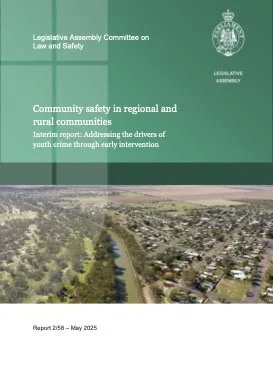Community safety in regional and rural communities: interim report. Addressing the drivers of youth crime through early intervention
By The Legislative Assembly Committee on Law and Safety ,
Parliament of New South Wales
Crime is a serious concern for many regional and rural communities in New South Wales (NSW). Since the COVID-19 pandemic, young people are increasingly involved in certain forms of crime, like motor vehicle theft. Participants in this inquiry emphasised that youth offending is a deeply complex social issue, and one that cannot be solved through increased policing alone. Early intervention is the most effective way to prevent young people from engaging in criminal behaviour. Smart, evidence-based strategies are required to deliver lasting change for communities.
There are excellent programs being delivered across NSW but there are also service gaps, inefficiencies in referral processes, and limitations around government funding that undermine the effectiveness of early intervention efforts.
The report makes a number of recommendations for improvement in areas such as supports for victims of crime; upskilling youth service providers; targeted early intervention programs; and partnering with community and educational organisations.
Key findings
While property crime in regional NSW has fallen over the two decades to 2023, it remains significantly higher compared to Greater Sydney.
Sensationalist media coverage of youth crime in rural and regional NSW heightens public anxiety and encourages negative perceptions of young people.
Youth crime is significantly impacting regional and rural communities, undermining community cohesion and adversely affecting the mental health of victims of crime and their families.
Use of violence is increasing in some cohorts of young people and is linked to offending behaviour.
Youth service providers need targeted training so they can work safely and constructively with young people who use violence.
Sydney: Parliament of New South Wales, 2025. 147p.


